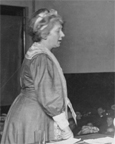Anne Cobden-Sanderson
Anne Cobden-Sanderson | |
|---|---|
 Anne Cobden-Sanderson in 1881 | |
| Born | Julia Sarah Anne Cobden 26 March 1853 London, England |
| Died | 2 November 1926 (aged 73) Hammersmith, England |
| Spouse | |
| Parent | Richard Cobden |
Julia Sarah Anne Cobden-Sanderson (née Cobden; 26 March 1853 – 2 November 1926) was an English socialist, suffragette and vegetarian.
Life
[edit]Cobden was born in London in 1853 to Catherine Anne and the radical politician Richard Cobden. After her father died, she was educated at schools in Britain and Germany. She lived for a time at the home of George MacDonald and later at the home of William Morris. In 1882, she married the out-of-work barrister T. J. Sanderson, and they both took the surname Cobden-Sanderson.[1]
Anne was concerned that her husband was thinking rather than doing, and she suggested that he take up book-binding. They were already in the social circle of William Morris and Jane Burden, and it was her husband who first coined the term "Arts and Crafts". Morris had already established the Kelmscott Press when Anne's husband and a photographer named Emery Walker agreed to found a press. The press was named the Doves Press and the profits were to be shared, but it was Anne who put up the capital of £1600 to start the business. Crucially, it was agreed that should the partnership end, Walker would be entitled to a copy of the font that they proposed to create. The Doves Type was created and Anne's single-minded husband used strict "Arts and Crafts" principles to create the Doves Bible, which was sold at a £500 profit. By 1906 the partners had fallen out over Walker's lack of interest and her husband's obsessive interest. Despite the agreement, Anne's husband did not deliver a copy of the font and instead arranged for every copy of the design to be dropped into the River Thames.[2]

Cobden-Sanderson worked for the Independent Labour Party and was arrested as a suffragette in October 1906 (along with Minnie Baldock and Nellie Martel). George Bernard Shaw wrote a letter of protest in September and she was released the following month.[1] She was a founding member of the Women's Freedom League.[3] She also helped form the Women's Tax Resistance League in 1909.
In 1907, she was invited to speak in the United States by Harriet Stanton Blatch to tell American suffragettes about the protest methods used in Britain. She addressed the first meeting of the Bryn Mawr College Suffrage Society using the title "Why I went to Prison".[3] She went to America with her husband and, while she spoke to women's rights groups, he was welcomed as an "Arts and Crafts" celebrity.[1]
In 1910, she participated, alongside her sister Ellen Melicent Cobden, in the Women’s Suffrage Procession.[4]

In 1922, her husband died. After his death, Cobden-Sanderson paid a large sum to settle a dispute with Emery Walker. This money was to compensate him for the loss of the typeface that her husband had thrown into the Thames when his partnership with Walker ended.[5]
Cobden-Sanderson died in Hammersmith in 1926.[1]
Her great-great-grandson, Nick Cobden-Wright started a campaign to save her former home, Dunford House, Midhurst (also home to her father Richard Cobden, the radical and Liberal MP) from sale in 2019 by current owners, YMCA. It contained her banner 'No Vote No Tax' which she had held at the Downing Street protest. His Cobden Foundation campaign was backed by Emmeline Pankhurst's great-grand-daughter, Helen Pankhurst, CBE among others.[6]
Vegetarianism
[edit]Cobden-Sanderson studied theosophy and vegetarianism.[7] She became a vegetarian at age 20 and authored How I Became a Vegetarian, in 1908.[8][9]
In 1908, she formed the New Food Reform Movement with Sarah Grand and vegetarians Charlotte Despard, Beatrice Webb and Seebohm Rowntree.[10] The movement aimed to enlighten public opinion about healthy dieting.[10] Cobden-Sanderson opposed the rich meat diet of the period, arguing it was harmful to health and bad for digestion.[10]
Diary
[edit]The papers of 20th century Holloway governor Joanna Kelley are at the LSE library and they contain Sanderson's (confiscated?) prison diary.[11]
References
[edit]- ^ a b c d A. C. Howe, (Julia Sarah) 'Anne Cobden-Sanderson (1853–1926)', Oxford Dictionary of National Biography, Oxford University Press, 2004 accessed 28 July 2015
- ^ "The Fight Over the Doves". The Economist. 21 December 2013. Retrieved 28 July 2015.
- ^ a b The Suffrage Cause and Bryn Mawr – The British Lecturers, Brynmawr College, Retrieved 28 July 2015
- ^ Crawford, Elizabeth (2 September 2003). The Women's Suffrage Movement: A Reference Guide 1866-1928. Routledge. p. 637. ISBN 978-1-135-43401-4.
- ^ Anne Cobden Sanderson, Spartacus, Retrieved 27 July 2015
- ^ Hunt, Marianna (12 May 2019). "Meet the man trying to open a museum dedicated to his ancestor, Richard Cobden". The Daily Telegraph / Sunday Telegraph. Retrieved 4 February 2021.
- ^ "(Julia Sarah) Anne Cobden-Sanderson 1853–1926 by Clara Manasian Cook". Women's International League for Peace and Freedom.
- ^ "Julia Sarah Anne Cobden-Sanderson 1853-1926 Socialist and Suffragette" Archived 20 October 2020 at the Wayback Machine. Hurley and Skidmore Family History.
- ^ Cobden-Sanderson, Anne (1908). How I Became a Vegetarian. Printed at the Doves Press No. 1 The Terrace, Hammersmith, W.
- ^ a b c Chung, Ji Won. (2016). Picturing Women's Health. Routledge. pp. 54-55. ISBN 978-1-84893-424-5
- ^ histprisonhealth (2 February 2018). "Suffragette Diary". Exploring the history of prisoner health. Retrieved 26 June 2020.
